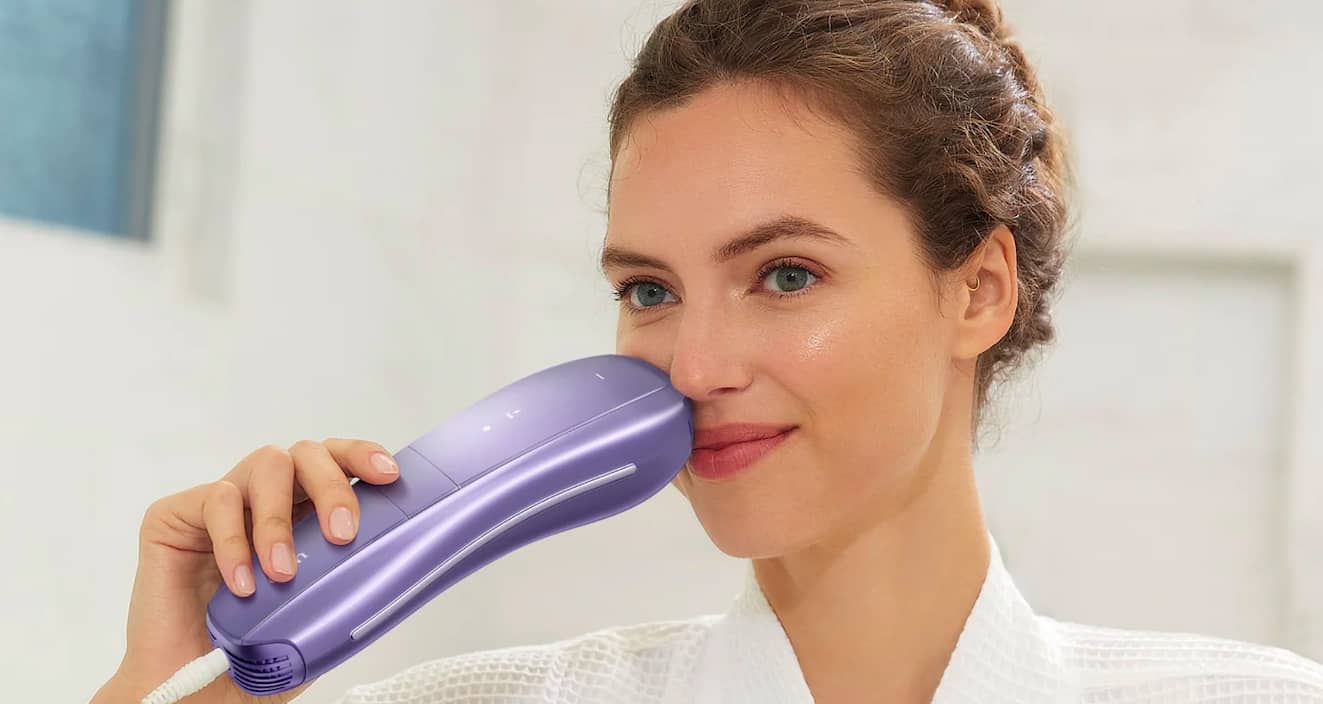Polycystic Ovary Syndrome (PCOS) is a disorder that affects millions of women globally. One of the symptoms of PCOS is the presence of facial hair, which is known as hirsutism. Hirsutism can be uncomfortable and emotionally distressing. It’s important to understand the causes of this symptom in order to effectively manage it.
In this guide, we will explore the symptoms and causes of hair related to PCOS and discuss various strategies to effectively address and minimize its impact on daily life.
1. Understanding PCOS
PCOS is a disorder that affects people with ovaries. It is characterized by imbalances in hormones. It leads to symptoms such as irregular menstrual cycles, ovarian cysts, elevated levels of androgens, and sometimes difficulties conceiving.
2. Can PCOS Cause Hair Growth?
PCOS can lead to hirsutism, which is primarily caused by hormone levels (androgens) in women with PCOS. This condition can result in increased sensitivity of hair follicles, leading to hair growth in areas typically associated with male-pattern hair growth, such as the lip, chin, and jawline. Hirsutism can be physically uncomfortable and emotionally distressing for individuals affected by it.
3. How does Facial Hair Manifest in Individuals with PCOS?
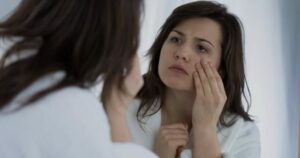
Facial hair related to PCOS is characterized by the presence of dark hairs in areas where women typically have visible or finer hair. These hairs tend to grow after removal and may have a coarser texture and different color compared to other facial hairs due to their nature, which is influenced by PCOS.
It’s important to note that the appearance of hair related to PCOS can vary from person to person. Not everyone with PCOS will experience an equal level of hirsutism. If you have concerns about your facial hair growth, it is advisable to consult a healthcare provider who can evaluate your condition, provide a diagnosis if necessary, and discuss treatment options tailored specifically for you.
5. How can I determine if my Facial Hair is due to PCOS? What are the Indications
It’s important to recognize signs and symptoms to recognize hair related to PCOS. Here are some indicators that may suggest a connection between hair growth and PCOS:
Excessive Hair Growth
PCOS-related facial hair is characterized by the presence of hair in areas where men typically grow facial hair, such as the upper lip, chin, and jawline.
Rapid Regrowth
After removing the hair through methods like shaving, plucking, or waxing, it tends to grow. This rapid regrowth often makes it noticeable within a period of time.
Location and Distribution
Facial hair growth associated with PCOS tends to be concentrated in areas of the face like the lip, chin, and jawline. In some cases, it may extend to the cheeks and neck.
Association with PCOS Symptoms
Individuals with PCOS may also experience distinct symptoms such as:
- Irregular menstrual cycles,
- Ovarian cysts,
- Acne breakouts,
- Weight gain
These additional symptoms can further indicate the presence of PCOS-related hair.
Changes in Hair Texture
Compared to the vellus hair that is typically found on the face PCOS related facial hair may feel thicker and coarser in texture.
Family History
If there is a family history of PCOS or hormonal imbalances, it might increase the chances of experiencing facial hair growth related to PCOS.
If you suspect that your facial hair growth could be linked to PCOS, it’s important to consult with a healthcare professional, for an evaluation and diagnosis. They can perform tests review your history and provide appropriate recommendations for managing the excess facial hair associated with PCOS. Remember, early detection and intervention can lead to management and an improved quality of life.
6. Where Does PCOS Facial Hair Typically Appear?
Excessive facial hair growth caused by PCOS usually starts in areas where men generally develop hair. The common locations for the appearance of excess hair due to PCOS include:
Upper Lip
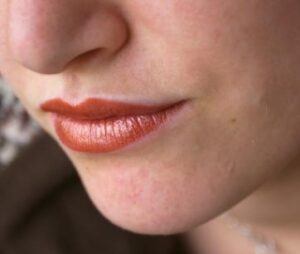
Excess facial hair related to PCOS may often appear on the upper lip. Hormonal changes commonly affect this area, leading to increased hair growth.
Chin
The chin is another site where facial hair onset occurs in individuals with PCOS. It may involve dark hairs that require maintenance.
Jawline
Hair growth along the jawline, on the sides, is a feature of hirsutism associated with PCOS.
Dealing with this issue can be quite bothersome for individuals who are affected by it. It’s worth noting that the pattern and extent of hair growth can differ from person to person. Some people may experience hirsutism, while others may have milder symptoms. Additionally, although these areas are commonly associated with facial hair growth in PCOS, hair can also appear in parts of the face.
If you notice an increase in facial hair growth in these areas, it’s a good idea to seek advice from a healthcare professional. They can conduct an evaluation and provide personalized treatment recommendations based on your situation. They will also be able to determine the cause of PCOS and offer strategies for managing facial hair related to it.
7. What are the Treatments for hirsutism with PCOS? How to Stop It?
How to stop facial hair growth due to PCOS? Now, let’s explore some treatment options for hirsutism caused by PCOS.
1. Medical Treatments

Medical treatments for removing hair caused by PCOS involve approaches aimed at addressing hormonal imbalances that contribute to excessive hair growth. Here are some used medical treatments.
Birth Control Pills
Hormonal contraceptives like birth control pills, patches, or injections can help regulate hormone levels. Remember that seeking guidance is crucial when dealing with hirsutism due to PCOS since they can provide advice tailored to your specific needs.
Treatment options for reducing facial hair growth in individuals with PCOS include approaches.
- Certain medications, known as anti-androgens, such as Spironolactone and Finasteride, are often prescribed to counter the effects of androgens. By doing these medications help reduce hair growth.
- Eflornithine is a prescription cream that can be applied topically to slow down hair growth in areas. It achieves this by inhibiting an enzyme for hair growth.
- Some oral contraceptives have been designed to possess androgenic properties making them particularly beneficial for individuals with PCOS who experience hirsutism.
- GnRH agonists are another option that helps regulate hormone levels by suppressing the production of hormones from the ovaries, thereby reducing hair growth.
- Consulting with an endocrinologist, a specialist, in hormone-related conditions, can provide treatment plans and recommendations based on an individual’s hormonal profile.
It’s important to emphasize that medical treatment should always be tailored to meet the needs, preferences, and health status of each individual.
In addition, it’s important to note that results may vary, and patience is necessary to achieve a reduction in facial hair growth. It is crucial to consult a healthcare professional who specializes in managing PCOS for advice and treatment planning.
2. Procedures
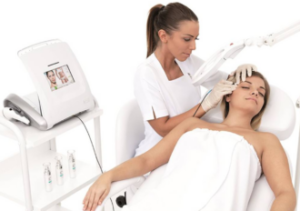
Electrolysis
Electrolysis is an effective method for removing facial hair caused by PCOS. This technique is safe and precise, targeting individual hair follicles with the use of a current. It has been utilized for years. Offers a long-lasting solution to unwanted hair growth.
During the procedure, a trained electrologist carefully inserts a sterilized probe into the hair follicle without piercing the skin. The probe emits a current directly into the root of the hair impairing the follicles’ ability to produce new hair. There are three methods of electrolysis; Galvanic, Thermolysis, and blend.
While each technique has variations in approach, their goal remains the same – destroying the hair follicle.
Electrolysis is recognized as a method of hair removal. With treatment over time, it can significantly reduce hair density. Some individuals may even experience complete removal of unwanted hairs.
It’s worth noting that mild discomfort during electrolysis treatments can occur; however, this sensation varies from person to person, depending on their pain tolerance.
While electrolysis is an option, for hair removal it requires dedication and patience, as visible results may take some time. However, many individuals with PCOS trust. Find electrolysis to be highly effective for term facial hair removal. It’s always advisable to consult a healthcare professional or a licensed electrologist for advice and treatment.
Laser Hair Removal
Another effective method for managing facial hair growth in individuals with PCOS is laser hair removal. This technique involves using beams of light that target the pigment (melanin) in hair follicles. During a laser hair removal session, a specialized device emits pulses of laser light onto the skin, which heats up the melanin in the hair follicles, damaging them and preventing growth.
Laser hair removal works best on individuals with hair and lighter skin tones because the contrast between their hair color and skin tone makes it easier for the laser to precisely target the hair follicles. It is highly effective. This can lead to a reduction in overall hair density. With sessions, some people may even experience a long-lasting reduction of unwanted facial hair.
The duration of each laser session can vary depending on the treated area ranging from a few minutes to an hour.
For results, it is usually recommended to have sessions of laser hair removal, with several weeks in between. People often describe the sensation during the procedure as similar to a rubber band snapping against the skin though some areas might be more sensitive than others.
After each session of the treatment, you should cover your face from sun exposure. Showers or intense exercise can also irritate the skin, so avoid such activities. Laser hair removal is one of the most used and convenient solutions for managing facial hair growth. But its result may vary for each person, depending on the treated area, skin, and hair types. You should consult with a laser technician for advice and treatment, and he/she will suggest better as per your requirements.
IPL Hair Removal
IPL hair removal is no doubt an affordable and easy-to-apply method for hair reduction. It can reduce and manage facial hair growth associated with PCOS. This hair removal method emits a spectrum of light that targets the melanin in hair follicles to inhibit hair growth. The melanin absorbs this energy and damages the follicles.
The advantages of this process are countless, and one significant advantage of IPL hair removal is its effectiveness in hair reduction and long-lasting outcomes.
IPL is an option for all skin types, and a mild stinging or snapping sensation can be felt during the procedure. IPL guarantees lasting results, and some individuals only require occasional touch-up sessions.
Furthermore, you don’t need to perform IPL at a saloon; it can be done at home. If you don’t know how to use IPL at home properly, you can get help from a licensed IPL technician. A consultation can determine if IPL is suitable for your skin and hair type and offer a treatment plan to address facial hair related to PCOS.
Home Remedies

The result of home remedies for PCOS hair removal is not long-term, and you have to opt for more effective and long-term hair reduction methods such as IPL laser technology and electrolysis. These home remedies do not target the cause of the issue but may give you some temporary hair removal. Here are some home remedies you can try.
- Plucking
This process involves using tweezers to remove hair from its roots. Some methods of Plucked hair work well for small body parts like eyebrows, upper lips, and facial hair.
We apply wax to remove the hair. It’s suitable for body areas such as the legs, chin, belly, arms, and face. It gives us lasting results compared to other hair removal methods.
- Bleaching
It lightens the color of the hair and is best for facial dark hair. It doesn’t remove the hair and makes hair less visible.
- Turmeric Paste
The inflammatory and antibacterial properties of this ingredient are helpful in hair reduction. You can make a paste by mixing turmeric with water and applying it to the skin to limit hair growth.
- Sugar and Lemon Paste
A mixture of sugar, lemon juice, and water is applied and then removed by pulling it off. It is effective for removing hair.
- Papaya Paste
Raw papaya contains an enzyme called papain that can prove helpful in inhibiting hair growth. You can make a paste from papaya. Apply it to your skin.
Remember to conduct a patch test before using home remedies to prevent reactions. It’s important to note that home remedies may not yield long-term outcomes compared to treatments such as laser hair removal or electrolysis. It is highly recommended to consult with a healthcare provider for an approach to managing hair growth associated with PCOS.
Changes in Lifestyle

Incorporating lifestyle changes such as weight loss, a balanced diet, regular exercise, and less use of alcoholic products can play a role in managing and reducing facial hair growth linked to PCOS. Here are some effective strategies.
Consistency is important to get results in reducing the growth of facial hair associated with PCOS. Consult healthcare for better recommendations on how to make positive and healthy changes in your lifestyle.
8. Benefits of IPL Hair Removal for PCOS
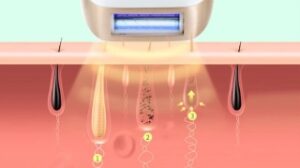
IPL hair removal offers benefits with PCOS facial hair reduction:
- Targeted Hair Reduction – In IPL treatment. we target the hair follicles to terminate its growth leading to a reduction in hair growth. The procedure doesn’t involve surgical incisions or needles therefore, it is comfortable hair removal method than other painful methods of waxing, plucking, and threading.
- At-Home Possibility – IPL device is easy to use at home, and people affected with hair growth due to PCOS can conveniently use IPL at-home device in the privacy of their homes.
- Long-Term Results – You get long-term results when using IPL. It also offers a reduction in hair density.
- Suitable for Skin Types – IPL is generally safe for a range of skin tones and hair colors, although it may be less effective on very light or dark skin.
- Quick Treatment Sessions – IPL treatment offer fast result compared to time-consuming methods like waxing, shaving, threading, and medication.
- Reduced Risk of Ingrown Hairs – IPL does not involve pulling hair out from the root, thereby minimizing the likelihood of ingrown hairs. The result of IPL is cost savings compared to spending on waxing or other hair removal methods offering temporary results.
- Boost Confidence – Hair-free faces boost confidence levels and enhance overall comfort with one’s appearance.
In a nutshell,
It’s worth mentioning that the effectiveness of Ulike IPL can differ from person to person, even though it can be the best option for people with PCOS.

 By myulikeadmin
By myulikeadmin
